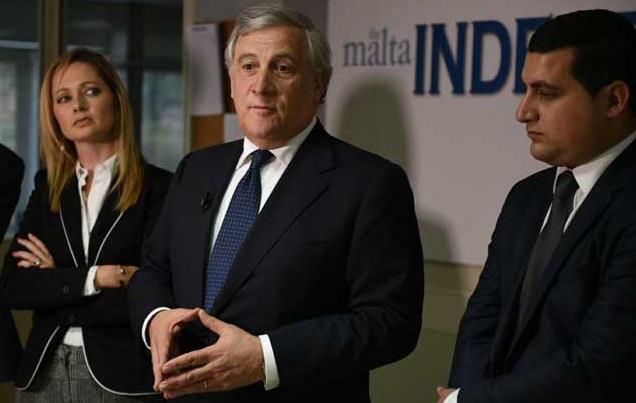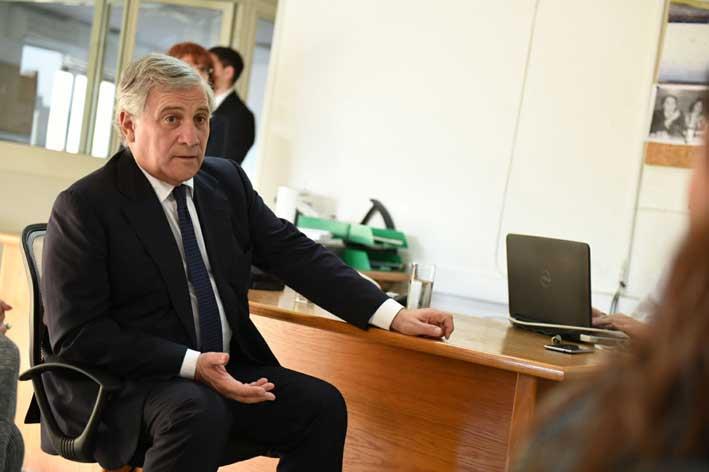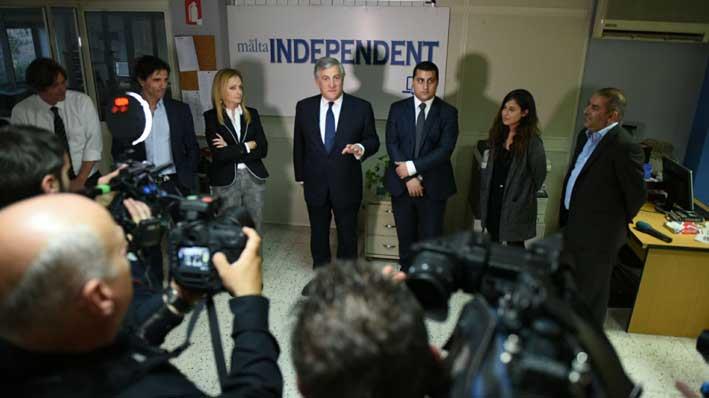As the president of the European Parliament, you represent more than 500 million people yet you are here on this tiny island of Malta. Why?
For us, defending democracy and the freedom of the press is vitally important. I came to Daphne’s funeral because it is an important moment and we need to shed light on this tragedy. The murder is not only a Maltese problem, but also a European one. To kill a journalist is to kill freedom, to kill transparency. This is why I am calling for an international inquiry and on Europol to assist in investigations. I want to know who Daphne’s killers are, and who sent them
You have called for Europol to help the Maltese with the investigation into Daphne’s murder. Is this a sign from Europe that you do not trust our institutions?
It is important to help the Maltese institutions, but there is the police here and there is the judiciary. As I said before, I do not know who the perpetrators are, and they could very well be outside of Malta. I think it is also important for Europol to know the history of this murder. There are many different interests, and ‘following-the-money’ for example requires a European or international investigation.

Faced with this assassination, you told the European Parliament that you ‘expect that Malta will see to it that justice will prevail’. Why ‘expect’? Do you doubt that justice will be served?
I am pushing to strengthen Maltese authorities, but we need to work a lot on this. Not only for the first, second, or third weeks, but long-term in order to shed light on the issue. We need to defend and strengthen the Maltese police and judiciary by increasing human resources and involving international organisations, like Europol. In fact, when I proposed this idea to the European Council, Prime Minister Joseph Muscat was in favour.
There are sections of the Maltese population, as you might be aware, that are not happy with the way police investigations are conducted in the country. Is the European Parliament taking note of what the people are saying that they have no trust in the police force?
It is not my job to speak about Malta’s internal problems. I think that the European Parliament would like to know the state of the rule of law in the country, which is why we are sending a committee to Malta to conduct a political investigation. After there will be a plenary session held on 14 November to discuss the issue, and a vote on a resolution will take place the next day. A ceremony will also be held which will rename the pressroom after Daphne Caruana Galizia; I have invited the family to this ceremony.

I am sure Maltese people would be very grateful for the initiative; however, they would say that this is not a concrete measure and does not give them hope that the EU is doing anything for freedom of speech, democracy and rule of law. What would you say to those people?
We look at Malta every day, we try to shed more light on the situation every day, we want to know where and who the killer is every day. We will work on this more at a political level. I said before that we are not judges, we are not the police, we are Members of Parliament and our job is to try push in the right direction. That is why we are in favour of Europol engagement and an international inquiry. This is our job, and we will work not only today but in the next weeks and months as well.
This has to be very clear; for us, Daphne’s murder is not closed. We will work on this full time because the freedom of the press is not a problem for Malta but for everyone in European. I am a journalist; I know the problems very well. It is not easy to be a journalist, but if you work well, transparency and freedom are ensured. Probably Daphne was close to the most important point of this work, and she was killed for this.

Have you managed to communicate all this to the Prime Minister of Malta? What was his reaction?
My last meeting with him was at the European Council meeting where I said, in front of all the leaders of each EU member state, how important it was to have an international inquiry. He said he was in favour and, for me; he is not against the involvement of Europol.
As you might know, the Opposition party, which is a member of the EPP, has said that it was a political murder. I am going to be blunt... is Daphne Caruana Galizia’s blood on the Prime Minister’s hands?
I did not come to Malta for a political battle. I am the President of the Parliament and my job is to push forward a full investigation. The internal problems between the Opposition and the Majority are not my job. I am the Vice President of the EPP, and I am here as the voice of the entire parliament, and not just a part of it.

Daphne Caruana Galizia’s family has been insisting that bringing the culprit to justice is not enough; it has been argued that justice without change is no justice at all. Has the European Parliament asked the government to change something in all of this?
As I said, this is an internal problem. We want to know the situation on the rule of law in your country, but not in favour or against anyone, we are working for the citizens. We want to know what is happening, we want to why Daphne was killed.
It seems from what you are saying that you are going to hold the government accountable over what it intends to do.
I am President of the Parliament. I am not against the government and I respect the government elected by the citizens. For me, the full investigation is vital; this is the point, right, left, majority, opposition. At the moment, I want to work at shedding light on the content of the murder. Then more work to be done by judges, the police, and Europol. They study the situation. I work on a political level, so this is why I asked for an inquiry. The results are not my job, after the results, there are the responsible bodies. The most important point is to know what is happening through a full investigation at international level, because there may have been people working against Daphne outside this country.

The international media is giving the impression that democracy, rule of law, and freedom of expression in Malta has been substituted by the law of the jungle, with the country being portrayed as a ‘failed state’. Quoting The Guardian, ‘Malta’s main industries have been infiltrated by crime gangs’. As a journalist, I can tell you that this is not true. Do you share these views?
I don’t know; The Guardian is a very important newspaper. I am President of the Parliament, I am not a police officer, and at present, I am not a journalist. We need to check the situation. It is important to examine the situation with the help of Europol.
Does the fact that Daphne was brutally murdered make you think this was an attack on the institution of the freedom of expression, or do you think that this was an independent incident?
I don’t know; we need to know the conclusion of the inquiry.

But people are in the streets every weekend protesting asking for justice to prevail, the Police Commissioner and the authorities to take responsibility. Even we, as journalists, need to take what people have said into account.
On this point, the European Parliament will be sending a committee involving the PANA and LIBE committees, for a political inquiry. My colleagues will speak to journalists, politicians, and citizens; and after this trip we will have a meeting with the leaders of the parliamentary groups and we will have more of an idea of the situation in this country.
What is your message to the Maltese people?
The European Parliament and the European institutions are close to you. Malta is never alone, Maltese people are never alone; we will work for freedom and transparency. We want to know the name of the killers, and who sent them.